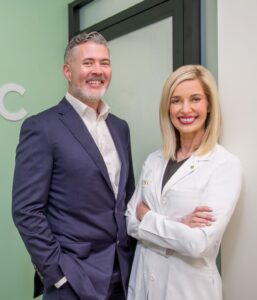What is functional medicine, and could it help you feel better?
Sponsored by SYNC
Functional or integrative medicine is a more proactive approach to health, and it’s centered around getting to the root cause of the patient’s issues and not just relieving their symptoms with medications. Here’s more from Doctor of Pharmacy Angie Huff, a holistic medicine specialist who founded SYNC in 2016, about how functional medicine can help you feel better and achieve optimal wellness.
Functional medicine is based on the idea that every patient is unique and that  many factors – like family history, lifestyle and environment – interact with each other to affect how you feel, Huff says. Many of SYNC’s patients struggle with symptoms like low energy, lack of libido, trouble sleeping at night, weight gain or feeling stressed or anxious.
many factors – like family history, lifestyle and environment – interact with each other to affect how you feel, Huff says. Many of SYNC’s patients struggle with symptoms like low energy, lack of libido, trouble sleeping at night, weight gain or feeling stressed or anxious.
The functional medicine approach requires time and commitment on behalf of the patient and his or her medical team, and the treatment involves lifestyle modifications including diet and exercise, using support supplementation and correcting nutritional deficiencies and hormone imbalances.
“At SYNC, we treat the person as a whole and not just a set of symptoms,” Huff says. “Sometimes, these patients have been put through the wringer with traditional medicine, but they haven’t gotten any answers, or they’ve been placed on an antidepressant, and that’s not really where they want to be.”
With SYNC’s vitality track, its most comprehensive track, the patient completes a comprehensive intake form regarding symptoms, family history and other environmental factors that could be affecting their health.
Then, the patient’s blood is tested for over 102 different wellness biomarkers – all the things your primary care doctor would look at, but also a deep dive into hormone levels, thyroid function and inflammation, as well as several different nutrients inside of cells.
Before going over results with the patient, the SYNC team, which includes its medical director (who has been certified by the Institute of Functional Medicine), nurse practitioner, and pharmacist complete a roundtable case review.
Next, the patient is brought in for what is typically a two-hour consultation to interpret lab results and discuss the next steps. “We have the science and data in front of us so we can really customize the supplement and wellness plan,” Huff says.
The FDA does not regulate supplements, Huff says, and quality can vary greatly among brands. At SYNC, all supplements sold are professional grade, which means they are produced in an FDA-registered facility, tested by an independent third-party laboratory and only available through a qualified practitioner. This ensures the highest quality of active and inactive ingredients and that each dose delivers the intended amount of active ingredients.
It’s important to note that SYNC works alongside a patient’s primary care physician and does not take the place of your regular doctor. “We’re a trusted referral source where physicians know they can tell their patients ‘This is not my arena, but here’s where you can go to get quality care and quality supplements,’” Huff says.
For more information, visit SYNC online at syncwellness.com.











